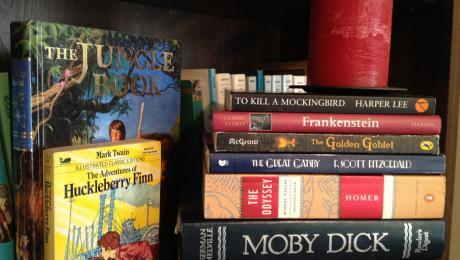Tell a Memorable Story in Four Easy Steps
No matter what purpose your writing serves, whether fiction or prose, speech writing or business writing, the words you serve to your audience need to make a powerful impression if they are to be remembered. There are four key aspects to storytelling that should be included to motivate your audience and inspire them to pay attention. Learning to incorporate all these elements will make your writing stand out and easier to remember.
The Conflict
If you dissect any story, you will find that it is driven by a degree of conflict. Conflict refers to any challenge that needs to be overcome in order to reach a goal. A fictional example would be a character forced to decide between two things he or she wants. A business conflict may involve a competitor trying to undermine your company by underpricing their product or someone leaking proprietary information. Presenting challenges clearly sets the basis for your story.
The Transformation
When your conflict must be faced head-on to achieve a goal, be it love, wealth, or whatever else applies, this brings on the transformation. Your main character would choose love over money and find true happiness. Your company would hire an investigator to discover who leaked your company’s client list to a competitor. Transformation has many faces, including physical, emotional, and financial. It is the moment of change that gets your story where you want it to be.
Make it Authentic
To stand out and keep your audience’s attention, your writing needs to be authentic. Authenticity means you do not want your work to sound like someone else’s. Worse, you do not want it to sound generic. Even fantasy can be authentic. The idea is to create something that your audience can relate to, even if metaphorically. Once your story incorporates this aspect, you will connect with your audience and they will find relevance in your words. It should speak to their needs and emotions.
Add Some Magic
Magic can be achieved in a number of ways, and it does not have to be fantastical or unrealistic. Think of your main character as having some sort of flaw or quirk which acts as the impetus for attracting their true love. For your business, imagine that investigator your firm hires has an uncanny way of finding information no one else could through secret sources or simply intuition. He will be the wizard who magically saves the company.
All these elements weave together to create memorable stories, both real and fictitious. Conflict makes readers or listeners crave knowing what happens next. Transformation makes them say, “Yes, that’s how it should go!” Authenticity provides real-enough situations that people can relate to and apply in their active listening. Finally, magic brings it all together in an ending they may have never seen coming. Together, these key storytelling aspects will make even the most mundane stories memorable.
- Published in Writing & Editing Resources
Should You Use a Writing Critique Group?
In the process of writing, it is helpful (even vital) to have other sets of fresh eyes look at your work and give you their honest opinions. Peer and professional feedback will help you hone your writing before it is published and even before it reaches the editor, saving you precious time in going from pen to print to paycheck. Joining a writing critique group, either virtually or in person, will be your weapon against common writing mistakes that are easy to miss.
Open Critique Groups
Open critique groups have no restrictions as to genre, level of experience, or any other criteria. These are the easiest groups to work with, especially for beginners. They are found both online and locally (try searching Craigslist or Meetup.com), and due to the diversity of people involved, they can help you expand your professional network. The major drawback is you may never know what types of people will be at any given meeting, so feedback can vary in quality.
Closed Critique Groups
Closed groups most often limit the number of writers who can join and may also have restrictions on genre, experience, or other criteria. They typically involve monthly or annual fees, which can hinder some talented writers from joining. On the bright side of closed groups, the numbers are smaller so you will develop trusting relationships with those critiquing your work.
Online-Only Critique Groups
Virtual or online groups also have their pros and cons. Some helpful things about them include not having to commute to local meetings, which saves you time, and being able to set your own schedule to work within them. If the lack of personal interaction bothers you, you can find one that holds meetings via Skype or Google+ for more real-time interactions.
In addition to the groups discussed above, you may want to add a critiquing partner to your network. Ideally, this should be someone familiar with your genre and your work as a whole. Having a partner gives you the flexibility of only having to arrange meeting times and places with one person. It is recommended that you choose a partner whose ideas differ a bit from yours, as this will give you a fresh perspective on your work.
No matter what critique style you choose, remember you want to vary your audience so you achieve perspectives from as many different viewpoints as possible. This will help you see your work through your readers’ eyes, as your real-world audience will also vary widely in their ideas and interests.
- Published in Writing & Editing Resources
The Fine Line between Good and Bad Writers
Being considered by your peers as a “good” or “bad” writer can make or break your creative career. However, you can make easy adjustments to elevate your work, get noticed, and above all get better at what you do. There is always room for improvement, and anyone who tells you otherwise has given up. This leads to the first point: Good writers understand perseverance is key.
Quitters Never Win
For those who are just starting to get their feet wet in the publishing world, the first few dozen rejections can be discouraging enough to make you reconsider your passion. Where bad writers throw in the towel, good writers know that the only way to meet their goals is to keep going. Perseverance means pushing through with faith that you will improve or find the break you are waiting for.
While some writers seem to possess a natural affinity for the craft, writing must, like anything else, be practiced. Bad writers wait until inspiration hits, going long periods of time between writing sessions and then blaming things like writers’ block for their lack of production during the down times. What good writers know is that having the discipline necessary to write through the dry times makes for additional productivity and becomes a good habit. Most of all, the practice achieved in disciplined writing is vital to success.
Learning to Take Criticism
Criticism is not always a bad thing. If a peer, an editor, or your client reviews your writing and makes suggestions as to grammar, punctuation, content, or any other point of contention, take every word of advice and learn from it. Only you can decide whether or not it applies to your work, but remember, it is not generally someone’s intention to give criticism as an insult. It is there to make you better. Listen to both the internal and external voices to help you hone your writing.
Speaking of honing your writing, here is another thing good writers understand: The first draft is never the last. Bad writers will quickly knock off a piece of work, see no room for improvement, and call it a day. Good writers, on the contrary, will polish their work with one or several revisions, tuning their work with precision until it stands above the rest.
From learning to take helpful feedback with a simple, “thank you,” to realizing your work isn’t perfect but still requires your dedication, there are numerous little ways in which you as a writer can improve. Stay humble, and always be prepared to see your writing project through to completion, even if it means re-writing it twice and taking a rejection in stride from time to time.
- Published in Writing & Editing Resources
From Bucket List to Solid Goals: Moving Your Writing Forward
Whether you are an experienced writer or aspiring to compose the next Great American Novel, disorganization with your time and goals is your worst enemy. Setting goals for your writing takes little time, but it can save you hours of frustration, missed deadlines, even the dreaded “writer’s block.” When you are ready to get serious about your writing, whether for personal or business purposes, the following tips will help you put your work into perspective and meet your goals.
The first thing you should do is empty your bucket. All writers have a bucket list, no matter how minor. Maybe you want to get the novel on paper that has been rolling around in your head. Maybe you want to submit and publish a certain number of poems this year or get picked up by a certain publication. Maybe you want to set up a blog that you can maintain and gain a large following. Whatever your goals, write them all down in one place so you can begin getting them organized.
Take Small Bites
Once your major goals are listed, start looking at their specifics. This is where you will break down each goal into bite-sized pieces so they do not seem so daunting to tackle. Two things to keep in mind are to make them measurable and attainable. Outline the steps you need to take to reach each degree of success. For example, before you start your blog, you need to secure web hosting, decide how much you can or are willing to pay for it, and pick a theme and layout.
To bring your goals to fruition, they need to keep moving. Set time limits for each task, and stick to them. Your eternal “To-Do List” will transform into something you will hold yourself accountable for. Be realistic in allotting the time you need for each step toward your goal. Also, be forgiving. Sometimes things come up and you cannot meet a deadline you set. Simply re-work your schedule, and keep moving forward.
It is up to you if you want to keep your writing goals with your personal schedule or in their own notebook or calendar. You may try different ways and see which aligns best with the way you work. It will make you feel quite accomplished as you are able to check things off, regardless of how you organize. Once you plot your strategies, following them and sticking with them will become an easier habit over time. Before you know it, your once-messy bucket list will become a portfolio of your achievements.
- Published in Writing & Editing Resources
Some Memorable Life Lessons that Children Have Learned from Classic Books
Children are not too young to appreciate insightful wisdom about the world, especially when it is packaged in an entertaining and engrossing book! Some of the most beloved children’s books have taught their readers life lessons through their engaging stories.
Lessons about friendship, adversity, individuality, differences, love, loss, and the importance of being optimistic and not giving up, are among the many life lessons illuminated by classic children’s literature. These classic books are never out of date.
Learning about Freedom and Rules
Madeleine L’Engle’s book, “A Wrinkle in Time,” is a fantasy adventure that teaches young readers about the importance of love. Meg Murry, the young heroine, must be brave to find her lost father. The insightful messages about freedom and rules in the book, first published in 1962, have not faded over time.
Respect the Environment
The message of “The Lorax” by Dr. Seuss is about respecting nature and the dangers of deforestation. The tale about Once-ler and the way he altered the landscape by removing trees is a cautionary tale about preserving the environment. Through this story, young readers are taught the importance of appreciating nature’s beauty.
Use Wit to Defeat Obstacles
In the story of “Matilda” by Roald Dahl., the child prodigy Matilda uses her wits to outsmart her foes and adversity. This book also encourages readers to appreciate books and reveals how they provided an escape mechanism for its protagonist.
Everyone Has Bad Days
First published in 1972, “Alexander and the Terrible, Horrible, No Good, Very Bad Day” by Judith Viorst was made into a movie released in 2014. The book is about one of those days when nothing goes right!
Love and Loss Are Part of Life
E.B. White’s “Charlotte’s Web” teaches children about love and loss through a story set on a farm about friendship between Charlotte the spider and Wilbur the pig and their animal friends. The importance of loyalty and friendship among different animals is a moving tale that every reader will remember.
Be Honest with Yourself
“Harriet the Spy” by Louise Fitzhugh is about the life and adventures of a precocious and intelligent 11-year-old who dresses like a boy and does not fit in with the clique. Her neighborhood adventures, interactions with classmates, and home life provide a vivid showcase that also lets readers know it is okay to be yourself, even when you do not conform, or feel like an outsider.
The Value of Optimism
Watty Piper’s “The Little Engine That Could” instructs readers about the value of optimism and determination.
Dr. Seuss, Roald Dahl, E.B White, and other authors of classic children’s literature have left behind stories that will resonate with children even today. The writers of these books understood the important role books play in development and used their creativity to enlighten children.
- Published in Writing & Editing Resources





